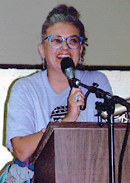Christina Pacosz
has been writing and publishing prose and poetry for nearly half a century and has several books of poetry, the most recent, Greatest Hits, 1975-2001 (Pudding House, 2002). Her work has appeared recently in I-70 Review, Jane’s Stories III, Women Writing Across Boundaries and a poem is forthcoming in Pemmican.
Christina has worked as a small-press-book bus driver, a waitress, a library clerk, a carpenter’s apprentice, a poet in the schools, and a teacher. Born and raised in Detroit, she has lived on both U.S. coasts, New York City, Alaska and southern Appalachia. For the past ten years she has been teaching urban Kansas City youth on both sides of the state line; she and her husband of almost twenty years call Kansas City home.
—Back to Milestones Contents/Issue Links—
|
The Third, the Youngest Sister, Explains Her Success
for Margaret Atwood
[The second sister, like the first] let herself be overcome by curiosity,
opened the
Room of Blood, looked inside, and paid for it with her life when the man returned.
—“Fitcher’s Bird,” The Brothers Grimm
Yes, it is true I knew from experience eggs break easily.
Didn’t I gather them every morning, picking each one between
breaths, I was that careful. My mother praised me for so few
eggs broken.
So, when he handed me the egg, I knew what to do. I found
a safe spot for it. I held the egg as if alive and put it
on the shelf. I made certain the egg could not roll off and
then forgot about it. My sisters I could not forget.
From his first loud knock on our door, I did not trust this
man who claimed to be a wizard. There was something about
him that did not walk upright. What power he possessed was
evil and small. I sensed havoc and murder.
How, you ask? There are just some things you know. I
learned this early on the farm. There was the sun and moon.
Planting and harvest. The surety of snow, cold, rain,
drought. Milking the cow the years we had one, I would press
my head to her warm flank, fingers moving without effort.
Thoughts, dreams, images of the day would rise in my mind,
like the milk that filled the cow’s bag. When he came to us
I was ready.
I will not claim it was easy turning the key. I admit I was
afraid of what I’d see the other side of the door, but I’d
been at butcherings before. Each autumn animal blood would
flow into the spent soil. Screams shattered the crisp air.
I helped cut carcasses, divide still warm bodies into hams,
legs, rumps, roasts. I loved liver hot with blood and raw.
I ground sausage, made head cheese from brains, pickled feet
with salt and onion, dropped slices of intestines onto hot
coals and in boiling fat. I savored sweet blood soup with
dried apples, honey, the rare currant.
I would be lying if I said I was prepared for the carnage. I
wasted no time in tears but my stomach churned. Their sweet
bodies strewn about like so much meat raised a power in me
that is hard to describe.
Once I had seen a man dressed in iron. He rode by with
a small group of richly clad folk. A sword hung at his
side. What rose in me, in that small castle room, was a power
like an army of such men, all dressed in iron, with gleaming
swords at their sides. I do not understand how I came to do
it, but I reached for a leg, a finger, an arm, a lung,
a breast, an eye, and I knew my sisters alive and whole.
[Originally published in Mississippi Mud]

Artist’s Statement
I
wrote this poem during a workshop with Margaret Atwood at Centrum in Port Townsend, Washington (where I was then living) in the early 1980’s. (I managed to take two workshops with her and consider myself extremely blessed to have done so.) Sam Hamill had recommended her for the summer workshop, as he did with many other literary lights over the years he and Tree Swenson had Copper Canyon, their press-in-residence, at Fort Worden State Park.
I had written persona poems, inspired by reading Anne Sexton, but had never written a prose poem until I worked with Atwood, who is a master of the form, I do believe. I had been writing prose and always, of course, poetry, since childhood, but I hadn’t really connected how the two could blend into a very powerful form to go beyond the limits of either. (I still write prose and have a book-length collection of short stories as well as three book-length prose manuscripts, two of which are novels, all unpublished.) At one point, Atwood had the group, which was all women, except for one lone male, focus on various fairy tales, including the one that inspired me to write the poem.
She was very accepting of the individuals in the workshop, but she also had a way of getting people to push past their own boundaries or self-imposed limitations, whatever they might be. She was an extremely positive writer/workshop leader and humble, too. I will never forget her saying that the reason she had such immediate publication success with her earliest writings was because there were so few writers in Canada then, particularly women writers. And, Atwood said, such success would be difficult to duplicate in the U.S.
|


